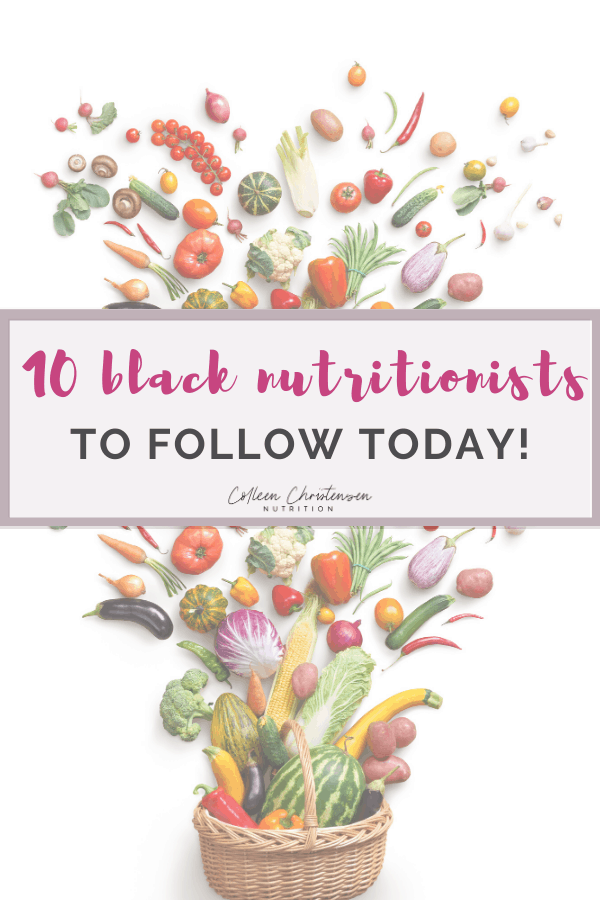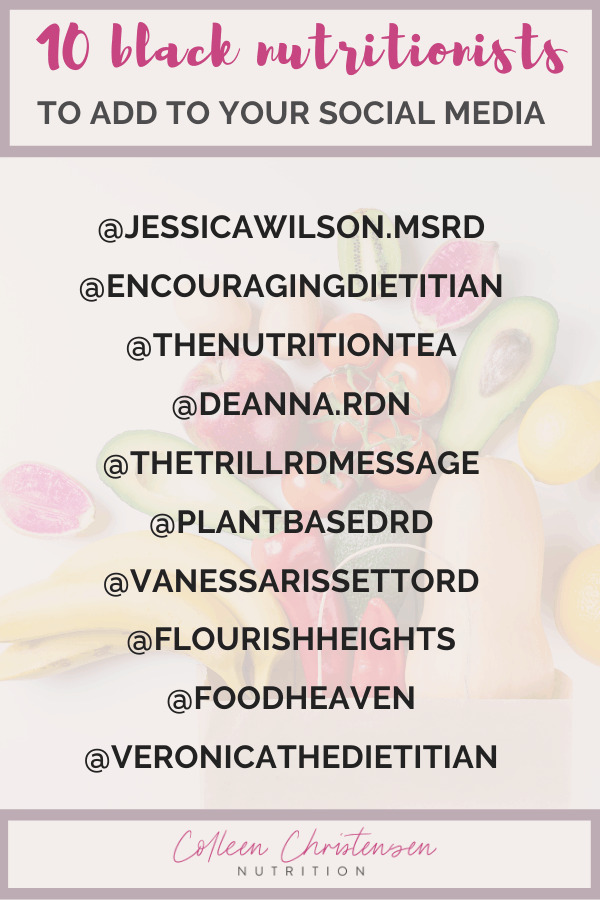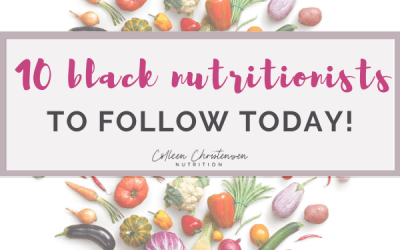Did you know that racial inequalities can lead to negative health and nutrition outcomes? It’s true. In the post we will discuss a few ways in which racism impacts health and nutrition status as well as highlight several amazing black nutritionist accounts to follow.
How Racism Impacts Nutrition
I was recently listening to the book Body Respect by Linda Bacon and Lucy Aphramor on Audible. I highly recommend this book for so many reasons, but one of the big pieces that stuck with me was the discussion of social injustice and its impact on health and nutrition. To be honest, this isn’t the first time that I had heard this piece of information but I feel like it’s the first time I truly allowed myself to look at it head on for what it is: outright truth. It sunk in.
We know that stress has negative health consequences. Be it stress from your job, physical stress on your body because you’re running from a lion, etc. Stress can impact our appetite by either suppressing it, possibly leading to malnutrition, or we may use food as a way to cope with our emotions, leading us to eat in excess.
Stress also plays a role in the actual digestion of our food. It can actually affect the nutrient absorption process, cause the GI system to experience inflammation, and even alter our actual stomach acids. All of this heightened stress and subsequent health consequences can lead to the development of chronic disease.
Now, the way it is explained in the Body Respect book is to imagine being under a state of stress 24/7. I mean, just think about those long term impacts knowing what we know about how stress impacts our health. This, in essence, is what can be experienced by those who experience social injustice.

Barriers To Health For People Of Color
I also recently read this article which discusses the racist roots of fighting obesity. The article is written by Linda Bacon, one of the authors of the book Body Respect (isn’t she fab?!) along with Sabrina Strings.
The article discusses how 4 out of 5 black women have a BMI classified as “overweight” or “obese”. They also have higher rates of “chronic cardiovascular, inflammatory and metabolic risk factors have been found to be elevated in black women, even after controlling for behaviors such as smoking, physical exercise or dietary variables.”
But many studies show that the stigma associated with body weight, rather than the body weight itself, is responsible for some adverse health consequences blamed on obesity, including increased mortality risk… From workplace discrimination and poor service at restaurants to rude or objectifying commentary online, the stress of these life experiences contributes to higher rates of chronic mental and physical illnesses such as heart disease, diabetes, depression and anxiety.
The Racist Roots of Fighting Obesity
It is not the weight that is the issue, it is the discrimination that black people face, and it can be a double whammy for black women- racism and sexism. These women (and men) are likely being prescribed weight loss to fix their health status when in reality we know that intentional weight loss does not work long term and leads to further negative health outcomes.
Difficult life circumstances cause disease. In other words, the predominant reason black women get sick is not because they eat the wrong things but because their lives are often stressful and their neighborhoods are often polluted.
The Racist Roots of Fighting Obesity
So, rather than trying to “fix” the health conditions themselves we need to instead be working to end racism, sexism, and weightism, as Linda and Sabrina recommend.
How To Help Overcome Social Injustice
Right now, at the time of me writing this blog post, there have been ongoing anti-racism riots due to the recent killing of George Floyd. Right now so many are working to #dothework to help spread anti-racism awareness. I, too, am working to do this. And while I love and support this movement I want to be sure this work can extend beyond this time of heightened awareness.
Personally, I have reflected on my Instagram feed, which is where the majority of my platform & influence resides, and realized that I had not connected with many black nutritionist accounts. Those who hold similar beliefs around food and nutrition that I do. Those who support the exact same work that I have made into my life’s work. I’m not proud to admit that, but it’s true.
One thing that I have done is to intentionally include more black nutritionist accounts into my social feed. This is something that I talk a lot about in terms of body diversity, but haven’t spoken out about much in terms of racial diversity. So, today, I wanted to share with you 15 black nutritionists and food bloggers that I have included in my own social feeds.
We can support these people of color by engaging in their content (which is fabulous), visiting their websites, making their recipes and leaving a comment (huge help to food bloggers!), and just overall continuing to #dothework to educate ourselves on anti-racism and actively spread the knowledge we receive.
Today I welcome you to take a moment to follow these amazing black nutritionist accounts and create a diverse social media feel to take just another step towards continuing to learn about and exhibit anti-racism.

10 Black Nutritionist Accounts To Follow
- Jessica Wilson, MS. RD (Instagram / Website)
- Christyna Johnson MS, RDN, LD (Instagram / Website)
- Shana Minei Spence,MS,RDN,CDN (Instagram / Website)
- Deanna Belleny Lewis MPH, RDN (Instagram / Website)
- Ayana Habtemariam MSW, RDN (Instagram / Website)
- Catherine Perez MS, RD (Instagram / Website)
- Vanessa Rissetto MS, RD, CDN (Instagram)
- Valerie Agyeman, RD (Instagram / Website)
- Wendy Lopez & Jess Jones, RDs, CDEs (Instagram / Website)
- Veronica Garnett, MS, RD (Instagram / Website)
Now, I realize that this won’t fix the social injustices and their health impacts, but it’s a step that I am taking and I wanted to share. Beyond this we can continue to educate ourselves on anti-racism (here is an amazing list of books on anti-racism!), support black owned business, and actively call out racism when we see it. We can be the change, but the change will take work.
Comment below with a “heck yes!” if you’re adding 10 new amazing account to your social feeds! Let me know if there are more you’d like to add to the list!
Happy eating gorgeous humans, let’s all be good people and continue to do the work.
XOXO
-Colleen




Leave a Reply